Context
THE Supreme Court Monday struck down the relief granted by the Gujarat government in August 2022 to 11 men who were sentenced to life for the gangrape of Bilkis Bano and murder of her family members during the 2002 riots.
About Judgement
- A bench of Justice BV Nagarathna and Justice Ujjal Bhuyan said the Gujarat government’s decision to grant remission to convicts was “an instance of usurpation of jurisdiction and… of abuse of discretion” and that the State “acted in tandem and was complicit” with the convicts.
- The Supreme Court said Gujarat was not the “appropriate government” to decide on the remission plea of the 11 men convicted for the “grotesque and diabolical crime…driven by communal hatred”.
- The bench pointed out that Section 432(7)(b) of The Code of Criminal Procedure, which deals with the power of remission, clearly indicates that the State within which the offender is sentenced.
Guidelines to be considered while making a decision on granting remission:
In ‘Laxman Naskar v. Union of India’ (2000) the SC laid down five grounds on which remission is considered:
- Whether the offence is an individual act of crime that does not affect the society;
- Whether there is a chance of the crime being repeated in future;
- Whether the convict has lost the potentiality to commit crime;
- Whether any purpose is being served in keeping the convict in prison; and
- Socio-economic conditions of the convict’s family.
Bilkis Bano Case
- Bilkis Bano was gangraped and her three-year-old daughter was among the 14 people killed by a mob including the 11 men, on March 3, 2002, during the riots in Limkheda taluka of Gujarat’s Dahod district.
- The 11 men were convicted in 2008 by a CBI court in Mumbai. The Supreme Court had transferred the trial in the case from Gujarat to Maharashtra in 2004 citing “exceptional circumstances”.
Release of the Convicts
- The writ petition of one of the convicts-Radheshyam Shah, who had completed 15 years and 4 months in jail.
- The Supreme Court had on May 13, 2022, ordered that the Gujarat government was the appropriate government to decide his remission plea in accordance with the state’s 1992 remission and premature release policy.
The Gujarat government had on August 15, 2023, released the 11 convicts under its 1992 remission policy.
- It had cited a “unanimous” recommendation of the Jail Advisory Committee (JAC) to grant the convicts remission on grounds of “good behaviour”.
Remission
- Remission means a reduction in sentence imposed on a person convicted of a crime.
- Remission is distinct from both furlough and parole in that it is a reduction in sentence as opposed to a break from prison life.
Both the President and the Governor have been vested with sovereign power of pardon by the Constitution.
- Under Article 72: The President can grant pardons, reprieves, respites or remissions of punishment or suspend, remit or commute the sentence of any person convicted of any offence.
- In all cases where the punishment or sentence is by a court Martial;
- In all cases where the punishment or sentence is for an offence against any law relating to a matter to which the executive power of the Union extends;
- In all cases where the sentence is a sentence of death
Under Article 161: A Governor can grant pardons, reprieves, respites or remissions of punishment, or suspend, remit or commute the sentence.
Statutory Power
State governments too have the power to remit sentences under Section 432 of the Code of Criminal Procedure (CrPC).
- This is because prison is a State Subject.
- The CrPC is proposed to be replaced by the Bharatiya Nagarik Suraksha (Second) Sanhita.
Section 432 of the Code Of Criminal Procedure allows state governments to grant remission to convicts.
- The provision states that “when any person has been sentenced to punishment for an offence, the appropriate government may, at any time, without conditions or upon any conditions.
- Under Section 433, any sentence may be commuted to a lesser one by the appropriate government.
- This power is available to State governments so that they may order the release of prisoners before they complete their prison terms.

